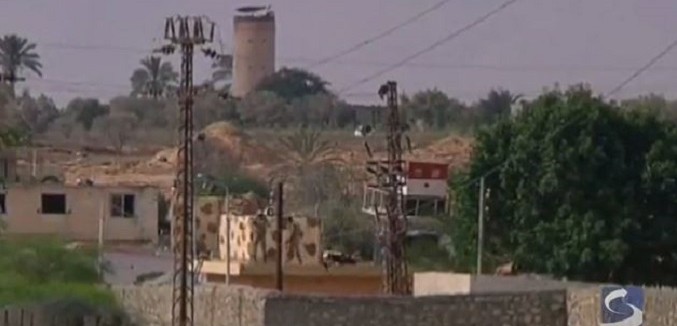The Sinai Peninsula is fast becoming the primary battleground between the Egyptian military and Islamist groups ranging from the Muslim Brotherhood and its Palestinian off-shoot Hamas, to Al-Qaeda and Salafist groups. The peninsula’s always-tenuous stability has been further undermined by the successive falls of Egyptian presidents Hosni Mubarak in 2011 and Mohammed Morsi in 2013. Homegrown Islamists, Hamas, and foreign jihadis are now regularly attacking Egyptian and Israeli targets in the Sinai.
Last week a lieutenant colonel in the Egyptian police was killed near the resort town of El-Arish when Islamists fired an RPG at his vehicle.
A day earlier, the Egyptian army said it had killed or arrested 200 fighters in Sinai over the course of a few days. 45 of those arrested were members of Hamas. Another 32 Hamas operatives, they said, were killed in the fighting.
An Egyptian military official described how the Egyptians “detected movements of Hamas activists cooperating with jihadists in Sinai,” adding that the army was having trouble asserting control over the region. He also outlined how “they enter Sinai through the tunnels [from the Hamas-controlled Gaza Strip] to carry out attacks, along with others, and then return to Gaza through the tunnels.”
The instability is triggering alarm bells in Israel, for which the Sinai has served as a buffer between it and the Egyptian mainland. Writing in Ma’ariv last week, columnist Amnon Lord described Sinai [Hebrew] as “Afghanistan in our doorstep.”
For decades the Bedouins who populate of the sparsely inhabited Sinai have had semi-autonomy from the Cairo government. Veteran Arab affairs analyst Ehud Yaari, writing for the Washington Institute for Near East Policy, recently explained the complicated dynamics driving the deterioration of stability:
The Bedouins have never been adherents of the Muslim Brotherhood. Rather, they sense weakness in the Egyptian military during the transition and see an opening to push their traditional demands for release of Bedouin prisoners, clemency to the many tribesmen still on wanted lists, and a different system of administration in the peninsula…
The Egyptian army has maintained its traditional stance of avoiding proactive measures against Bedouin militia strongholds. The military’s official policy is that its troops are in the Sinai to “assist” the Interior Ministry’s forces. In practice, this means taking a backseat despite being fully aware that police are incapable of confronting the well-armed Bedouin militias, which are gaining confidence and seem to hold government forces in low regard…
The one sector in which the military has displayed initiative is Sinai’s fourteen-kilometer border with Hamas-controlled Gaza. There, Egyptian troops have blocked many — though not all — of the illegal tunnels between the strip and the peninsula.
[Photo: STRATFORvideo / Youtube]




